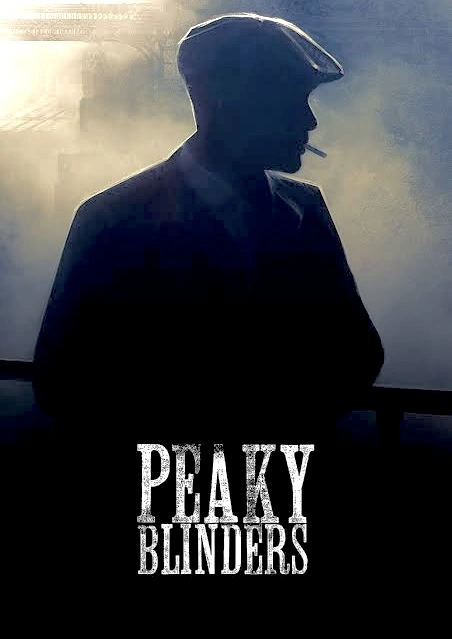Read our full review of Peaky Blinders, the British crime drama starring Cillian Murphy. Discover why this stylish and intense series is hailed as one of the best in modern television.

Peaky Blinders Series Review: A Gritty, Stylish Crime Drama That Redefines Television Storytelling
Created by: Steven Knight
Starring: Cillian Murphy, Paul Anderson, Helen McCrory, Sophie Rundle, Tom Hardy, Anya Taylor-Joy, Sam Neill, Adrien Brody
Genre: Crime, Drama, Historical Fiction
Seasons: 6
Original Network: BBC One / Netflix
Years Aired: 2013 – 2022
Language: English
Introduction
Few television series have managed to carve a legacy as stylish and culturally impactful as Peaky Blinders. Created by Steven Knight, this British period crime drama blends brutal storytelling, complex characters, and cinematic visuals to tell the rise-and-fall tale of the Shelby family in post-World War I Birmingham. With six gripping seasons, Peaky Blinders has become a modern cult classic — a show that’s as much about power and politics as it is about loyalty, ambition, and identity.
From its iconic opening credits to its thunderous rock soundtrack and sharp suits, Peaky Blinders is not just a TV series; it’s a movement. But what makes it so memorable? Let’s dive deep.
Plot Overview (No Spoilers)
Set in the aftermath of World War I, Peaky Blinders follows Thomas Shelby (Cillian Murphy) — a decorated war hero turned ruthless gangster — as he builds the Shelby family’s betting business into a criminal empire. The name “Peaky Blinders” comes from the gang’s real-life practice of sewing razor blades into their caps.
As the series progresses, the Shelbys face off against rival gangs, the British government, communists, Italians, the IRA, Americans, and even fascists — all while battling their own internal demons. Tommy’s ambitions take him from Birmingham’s backstreets to the highest echelons of British politics, and the consequences are often deadly.
Performances
Cillian Murphy as Thomas Shelby
Cillian Murphy delivers one of the most iconic performances in television history. His portrayal of Tommy Shelby is cold, calculating, magnetic, and layered with trauma. Tommy is both a war hero and a villain, a visionary and a broken man. Murphy’s steely gaze and hypnotic voice create a character that’s impossible to forget.
Helen McCrory as Polly Gray
The late Helen McCrory is equally commanding as Aunt Polly, the family’s matriarch and moral compass. Her character adds depth and gravitas, often stealing scenes with her strength, poise, and raw emotion.
Paul Anderson as Arthur Shelby
Arthur Shelby, the emotionally unstable older brother, brings volatility and vulnerability. Anderson’s performance perfectly captures Arthur’s violent outbursts and inner conflict.
Supporting Cast
- Tom Hardy as Alfie Solomons is a fan favorite — unpredictable, menacing, and oddly hilarious.
- Anya Taylor-Joy, Sam Claflin, Adrien Brody, and others shine in later seasons, adding new threats and dimensions to the storyline.
Writing & Direction
Steven Knight’s writing is sharp, poetic, and politically astute. Each season explores themes such as class struggle, post-war trauma, addiction, family loyalty, and the corrupting influence of power. The dialogues are loaded with intensity and purpose — no line is wasted.
The direction is consistently cinematic, with sweeping wide shots, gritty close-ups, and symbolic imagery. Directors like Otto Bathurst and Anthony Byrne bring a noir-like quality to the show that makes it visually distinct.
Cinematography & Production Design
The visuals are striking. Birmingham’s smoky factories, cobblestone streets, and dim-lit pubs feel both grounded and stylized. The show’s modern rock soundtrack — featuring artists like Nick Cave, Arctic Monkeys, and Radiohead — adds an unexpected, rebellious energy to the 1920s setting.
Costume design plays a huge role in building the show’s identity. The tailored suits, overcoats, and newsboy caps became so iconic they reignited real-world fashion trends.
Themes & Symbolism
- Trauma & PTSD: Many characters, especially Tommy and Arthur, carry psychological scars from the war. The series doesn’t shy away from showing their battles with inner demons.
- Power & Corruption: As Tommy rises, his moral compass falters. The higher he climbs, the more he loses parts of himself.
- Family & Betrayal: Loyalty is everything in the Shelby world, but trust is often tested. These relationships drive much of the emotional core.
- Politics & Revolution: The series critiques the British class system, explores socialism, and even dips into fascism in later seasons.
What Works
- Phenomenal performances, especially from Murphy and McCrory
- Stylized direction and production
- Strong, evolving character arcs
- Poetic and layered writing
- Memorable soundtrack and fashion
What Doesn’t Work
- Some subplots, especially in the middle seasons, can feel stretched or overly dramatic.
- The pacing slows occasionally due to the show’s focus on visual mood over plot.
- Later seasons introduce too many new characters, diluting earlier character development.
Verdict
Peaky Blinders is more than just a crime show. It’s a character-driven epic filled with drama, emotion, and style. It successfully bridges art and entertainment — offering Shakespearean-level tragedy wrapped in gangland drama. While the final season may leave fans wanting more closure, a planned movie sequel promises to continue the legacy.
Whether you’re drawn to political intrigue, gangster lore, or simply want to witness one of TV’s finest antiheroes, Peaky Blinders delivers on all fronts.
Best Movie Review(BMR) Rating: 9/10